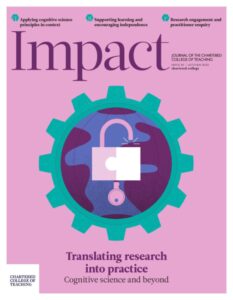Verbal teacher praise and feedback: influencing students’ self-concept and self-efficacy beliefs in mathematics classrooms
Written by: Sarah Hopkinson

7 min read
Sarah Hopkinson, Secondary mathematics teacher, UK; MSc student, University of Oxford, UK
Self-concept and self-efficacy, referred to in this study as self-beliefs, hold positively correlating relationships with mathematics achievement (Cvencek et al., 2018; Burns et al., 2020); therefore, low self-beliefs can hinder students’ learning (Bong and Skaalvik, 2003). Currently within The Academy, the inner London secondary school setting of this study, there are two ‘nurture’ classes in each year group, who are the lowest-attaining students. These classes are composed primarily, if not wholly, of students with extremely low self-beliefs, who believe that they cannot be successful and who regularly claim that they cannot complete tasks before attempting them, and thus choose not to participate. This study focuses on the two Year 10 ‘nurture’ classes.
What are self-concept and self-efficacy?
Self-concept is a student’s perception of their attainment level, primarily formed
Join us or sign in now to view the rest of this page
You're viewing this site as a guest, which only allows you to view a limited amount of content.
To view this page and get access to all our resources, join the Chartered College of Teaching (it's free for trainee teachers and half price for NQTs) or log in if you're already a member.
- Al-Harthy IS and Aldhafri SS (2014) The relationship among task-value, self-efficacy, and academic achievement in Omani students at Sultan Qaboos University. International Review of Social Sciences and Humanities 7(2): 15–22.
- Amemiya J and Wang MT (2017) Transactional relations between motivational beliefs and help seeking from teachers and peers across adolescence. Journal of Youth and Adolescence 46(8): 1743–1757.
- Asakereh A and Yousofi N (2018) Reflective thinking, self-efficacy, self-esteem, and academic achievement of Iranian EFL students. International Journal of Educational Psychology 7(1): 68–89.
- Bandura A (1977) Self-efficacy: Toward a unifying theory of behavioural change. Psychological Review 84(2): 191–215.
- Bandura A (1994) Self-efficacy. In: Ramachaudran VS (ed) Encyclopaedia of Human Behaviour, 4th ed. New York: Academic Press, pp. 71–81.
- Bong M and Skaalvik EM (2003) Academic self-concept and self-efficacy: How different are they really? Educational Psychology Review 15(1): 1–40.
- Burns RA, Crisp DA and Burns RB (2020) Re-examining the reciprocal effects model of self-concept, self-efficacy, and academic achievement in a comparison of the cross-lagged panel and random-intercept cross-lagged panel frameworks. British Journal of Educational Psychology 90(1): 77–91.
- Chen SK, Yeh YC, Hwang FM et al. (2013) The relationship between academic self-concept and achievement: A multicohort-multilocation study. Learning and Individual Differences 23(1): 172–178.
- Cvencek D, Fryberg SA, Covarrubias R et al. (2018) Self-concepts, self-esteem, and academic achievement of minority and majority north American elementary school children. Child Development 89(4): 1099–1109.
- Dijkstra P, Kuyper H, van Der Werf G et al. (2008) Social comparison in the classroom: A review. Review of Educational Research 78(4): 828–879.
- Girli A and Öztürk H (2017) Metacognitive reading strategies in learning disability: Relations between usage level, academic self-efficacy, and self-concept. International Electronic Journal of Elementary Education 10(1): 93–102.
- Henry MA, Shorter S, Charkoudian L et al. (2019) Fail is not a four-letter word: A theoretical framework for exploring undergraduate students’ approaches to academic challenge and responses to failure in STEM learning environments. CBE Life Sciences Education 18(1): 1–17.
- Nelson KL, Nelson KK, McDaniel JR et al. (2019) Majoring in STEM: How the factors of fear of failure, impostor phenomenon, and self-efficacy impact decision-making. National Social Science Journal 52(1): 76–87.
- Peiffer H, Ellwart T and Preckel F (2020) Ability self-concept and self-efficacy in higher education: An empirical differentiation based on their factorial structure. PLoS ONE 15(7): 1–24.
- Pulford BD, Woodward B and Taylor E (2018) Do social comparisons in academic settings relate to gender and academic self-confidence? Social Psychology of Education 21(3): 677–690.
- Schunk DH and DiBenedetto MK (2016) Self-efficacy theory in education. In: Wentzel KR and Miele DB (eds) Handbook of Motivation at School, 2nd ed. New York: Routledge, pp. 1–532.
- Simpson A and Maltese A (2017) ‘Failure is a major component of learning anything’: The role of failure in the development of STEM professionals. Journal of Science Education and Technology 26(2): 223–237.
- Vancouver JB, Thompson CM and Williams AA (2001) The changing signs in the relationships among self-efficacy, personal goals, and performance. Journal of Applied Psychology 86(4): 605–620.
- Wong AE (2016) Daily feedback of self-concept clarity and grit. PhD Thesis, Florida Atlantic University, USA.
- Yantraprakorn P, Darasawang P and Wiriyakarun P (2018) Self-efficacy and online language learning: Causes of failure. Journal of Language Teaching and Research 9(6): 1319–1329.
0
0
votes
Please Rate this content
Subscribe
Please login to comment
0 Comments
Inline Feedbacks
View all comments










